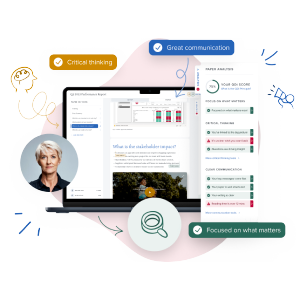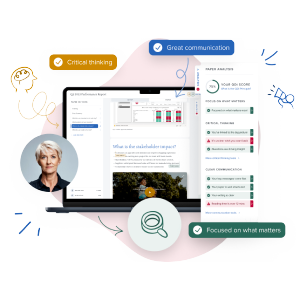James Emmett recently stepped down as Chief Executive of HSBC Bank plc & Europe. James had previously held positions as Chief Operating Officer for HSBC Bank Plc & Europe, CEO of HSBC Turkey, Global Head of Trade & Receivables Finance for HSBC Group and Regional President for Metro New York, HSBC USA. He has served on the Payment Strategy Forum in the UK, the Banker’s Association Boards in New York State and Turkey, the International Trade & Industry Group in the UK, the Banking Commission of the International Chamber of Commerce, and the WTO Expert Advisory Group on Trade Finance.
Will there be a return to “normal” after the COVID-19 crisis?
For many of us, the realisation has begun to creep in that going “back to normal” is not likely in the near months, or perhaps ever. Having emerged from the initial shock, we’re beginning to take stock of the many ways in which this crisis will leave a lasting mark on us as individuals, as families, as communities, as nations. The best-run organisations are doing the same. Short-term demands might have taken precedence in the initial stages of the crisis, but those who want to emerge stronger at the end of this painful period now need to address the long-term impact of the past few months.
“The firms that are going to do particularly well are the ones seeing the opportunity in the crisis and who are flexibly adapting — whether in their supply chains, the way they think about office working, or their customer proposition.”
~ James Emmett
The realisation that normal as we know it might be gone forever hasn’t quite sunk in for everyone. There are those of us who are impatient to get on with business as usual. Similarly, James has concerns that some companies believe they can push through this period and emerge back into something approaching “normality”. Only time will tell.
How much information is enough to make a decision?
The first and biggest challenge in any crisis is gathering the information needed to assess the situation and plan your response. James recalled his decision-making process when responding to a hack of credit card information in HSBC Turkey. The key for James was the ability to convene very quickly and to call on the support of both internal and external experts.
“The first thing is getting the right people around you as quickly as possible.”
~ James Emmett
Information gathering in a crisis is essential, but James caveats this with the fact you will often have to make decisions based on limited information.
“You need as much information as possible, but you’re never going to get it all.”
~ James Emmett
When stakes are high, and information is scarce, leaders have to bear the burden of making a final decision. What helped guide James through the process was a set of underlying principles. Those principles made it clear from the outset that the situation will be transparently communicated to customers in a way that avoids causing panic and retains trust in the brand.
“I had a set of principles which I was very clearly committed to operate within.”
~ James Emmett
When it comes to financial decisions, most established companies have a clear decision-making authority matrix. But where wider issues of governance are concerned, it’s sometimes less clear where the decision-making power lies. James bridged this through an ongoing and honest dialogue with his board and executive committees.
“The fact we were having a dialogue throughout meant that, when I had to make a decision, I felt I had the power and the board’s support to do this at speed.”
~ James Emmett
How do you know you’ve made a good decision?
A good decision is one that comes to fruition. A failed decision is one that keeps coming back in various forms and keeps springing up additional and alternative decisions. For James, one sign of a good decision is that another decision isn’t taken outside of the meeting. In a crisis, whether your decision was good becomes apparent faster than normal.
“When it comes to crises and incident management, you know if you’ve made a good decision because the outcome is very clear quickly.”
~ James Emmett
For James, a crucial aspect of ensuring you make sound decisions is allowing enough room for challenge and asking yourself whether you were subject to groupthink and whether there was a good debate.
“Find people who can challenge you in your decision-making.”
~ James Emmett
Another key aspect when looking at a strategic or even tactical decision at a board or executive committee level is assessing whether there’s a tangible action following the decision. Asking whether the decision is feasible and how it can be put into place is an important step in ensuring the decision is successful.
For the 5 steps we advise boards and leaders to follow to make good decisions, read our blog on the 5 tenets of decision-making.
What does radical uncertainty mean for decision-making?
Humans don’t like uncertainty. We've done our best to eliminate uncertainty from our everyday life. We punish uncertainty in our systems: for example, volatility in quarterly results is punished financially.
What we try to do in response to uncertainty is impose control over the world around us. We scenario plan, we bulk buy home essentials. But the coronavirus crisis has highlighted just how fragile that control is. Humanity has reached a stage in which those of us privileged enough to live in developed countries don't have to face the uncertainty of where we get our food. Yet, just a few weeks ago, the guarantee we could buy what we want at the supermarket was taken away.
This humbling realisation is making us question whether the future is any more uncertain now that it was back in January or than it usually is. So how much uncertainty do we face?
“There is more uncertainty, at least in people’s minds, because some of the planks upon which they have built their plans have disappeared.”
~ James Emmett
What James is interested in now is thinking about the long-term implications of what we know and also what we don’t know. One of the most valuable things boards can do is to scenario plan for the various eventualities of a situation — something they’re doing right now as they prepare for the scenarios of a V, U, W, or L-shaped recovery to the economy.
“If we go back to the end of 2019, we were planning for various scenarios, but we could make a reasonably coherent case for the expectations of the economy. Right now, we can’t do that.”
~ James Emmett
If the current crisis leaves boards and leadership with one lesson, then that perhaps should be that more can be done to ensure there are fewer potential disasters we’re not ready for. James believes boards have an important role to play to make this happen.
“Boards should build a culture which encourages people to raise their hand, not only if they’re seeing something wrong, but also if there’s something they’re worried about. This will give boards and leadership the potential threats they need to be thinking about.”
~ James Emmett
How can you defend decisions made in a crisis?
It’s not unreasonable to believe that decisions made with necessary haste and with limited information in the current crisis will later be scrutinised by regulators and other stakeholders with the benefit of hindsight.
In the finance sector, regulations such as SMCR, which was forged in the aftermath of the 2008 financial crisis, have a renewed importance today. While some regulators are easing their pressure on organisations, SMCR has made it clear that decisions made now will be put under the same level of scrutiny as before. Organisations will be expected to demonstrate decisions were made for the benefit of society at large — crisis or not.
How concerned should leaders be about being held to account by regulators for decisions taken in good faith? James’ approach to this issue is a simple one: he supports the view that the only question you need to be asking when making a decision is whether you’re acting in the best interest of all stakeholders concerned.
“Start your thinking with the question of what’s the right thing to do for all stakeholders. Once a decision is made, run it through the regulatory filter. If I’m commencing all decision-making with SMCR as my primary criteria, then I’m probably in the wrong mental space.”
~ James Emmett
The important thing is to avoid a lack of transparency, particularly in a crisis. James believes transparent and upfront communication with regulators is a crucial factor in mitigating potential issues. His advice is to run the risk of overcommunicating and keep the discussion in real time.
“Openly discussing the issues you’re facing and communicating your plans for solving those issues with regulators as they develop will stand you in good stead.”
~ James Emmett
The current crisis was not unpredictable. In 2015, Bill Gates warned the world it was not ready for a pandemic and shared his model for a response system in a now-popular TED talk. And a global pandemic was on the risk registers of a small number of boards. Gates spoke in the hope the 2014 Ebola outbreak would teach us a valuable lesson and spur us into action. Five years later, he observes his call to action was sadly ignored. We can all hope the current pandemic isn’t another learning opportunity we fail to seize. Let’s not squander the lessons for decision-making, dealing with crises, and renewing our commitment to society that these difficult times offer.





